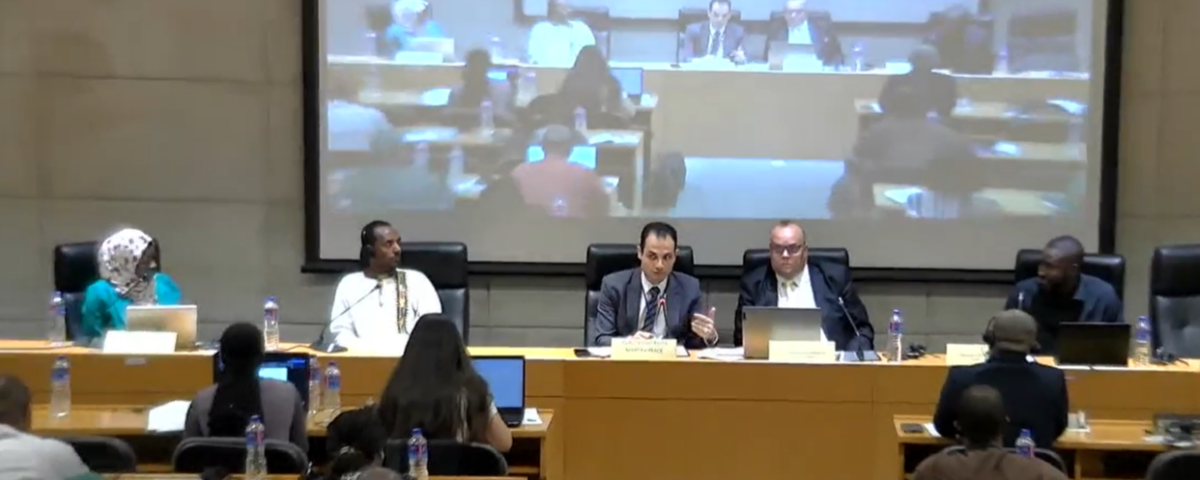In a continent rich with diversity yet marred by conflict, the quest for sustainable peace in Africa remains a pressing challenge. The panel discussion titled “Conflicts in Africa: Addressing Ethnic Tensions, Resource Competition, and Self-Determination to Build Sustainable Peace” brought together experts and advocates to explore the multifaceted causes of conflict and the pathways toward resolution. Moderated by Abdelrahmn Basha, Program Coordinator at Maat for Peace in Egypt, the session highlighted that Africa ranks second globally in armed conflicts, driven by ethnic tensions, resource disputes, and political instability.
Safa Mohammed from SIHA provided a harrowing overview of the situation in Sudan, where over 10 million people have been displaced and 2 million are seeking refuge in neighboring countries. She reported on countless casualties and extrajudicial killings, alongside widespread sexual and gender-based violence against women. The ongoing conflict has severely restricted access to essential food and healthcare for women and children. SIHA is actively providing psychosocial support to those grappling with mental health issues stemming from the violence. Mohammed emphasized that movement within Sudan is highly restricted, especially for human rights advocates, who face numerous checkpoints and heavy surveillance. She also highlighted the strict laws prohibiting abortion, which further complicate the challenges faced by women.
Mesud G. Reta, Executive Director of CEHRO Ethiopia, discussed the ongoing political conflicts in the Horn of Africa, many of which are state-sponsored. He pointed out that over 3.5 million people are internally displaced in Ethiopia alone, while conflicts continue to fuel rampant human trafficking and human rights abuses across the region. Reta criticized the African Union’s ineffectiveness in addressing these crises and noted that elections in South Sudan have been postponed due to ongoing conflict and a lack of political will.
Mr. Naji Moulay Lahsen, Director of Morocco’s CIDH, underscored the severe conflicts plaguing the continent, including genocide in Sudan and civil wars in Ethiopia. He called attention to terrorism in Somalia and Nigeria as contributing factors to weak governance, corruption, poverty, unemployment, and competition over resources. Lahsen emphasized that external actors often exacerbate these conflicts and advocated for strengthening education and engaging women and youth in conflict resolution efforts.
Mr. Momodou M. Mbenga from The Gambia’s Ministry of Foreign Affairs reaffirmed The Gambia’s commitment to protecting human rights through its National Human Rights Commission. He reflected on recent debates regarding FGM laws and emphasized the importance of cooperation among stakeholders to address conflicts on the continent effectively.
Participants’ Interventions
- A participant from Ethiopia expressed concern over the government’s failure to address regional conflicts meaningfully while noting international indifference toward humanitarian crises.
- A participant from Zimbabwe highlighted the need for youth involvement in discussions on human rights, particularly concerning climate migration.
- A participant from Uganda pointed out the heightened vulnerability of internally displaced women to sexual violence and called for unrestricted access to abortion for survivors.
- Dr. Nana Busia stressed the necessity for a clear definition of human rights and urged a comprehensive examination of interconnected issues.
- A participant from The Gambia shared personal experiences of severe movement restrictions faced by citizens in Sudan.
- Finally, a participant from Mali discussed how ongoing conflicts have disproportionately affected women and children, particularly those facing unwanted pregnancies due to sexual violence.
This panel discussion illuminated the urgent need for collaborative efforts to address ethnic tensions, resource competition, and self-determination as critical components for building sustainable peace across Africa.


